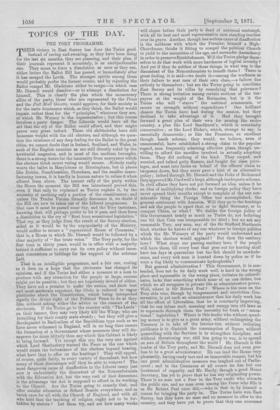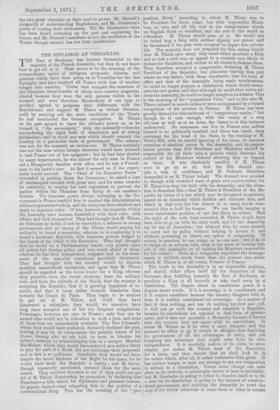TOPICS OF THE DAY.
THE TORY PROGRAMME.
THEIR victory in East Surrey has done the Tories good. Instead of raving and swearing, as they have been doing for the last six months, they are planning, and their plan, if their journals represent it accurately, is an unobjectionable one. They mean to force a dissolution as soon as they can, either before the Ballot Bill has passed, or immediately after it has escaped the Lords. The stronger spirits among them would probably prefer the former course, and by rejecting the Ballot compel Mr. Gladstone either to resign—in which case Mr. Disraeli would dissolve—or to attempt a dissolution for himself. This is clearly the plan which the momentary allies of the party, those who are represented by the Times and the Pall Mall Gazette, would approve, for their anxiety is for the caste dominance which, as they think, the Ballot would impair, rather than for the "principles," whatever they are, of which Mr. Watney is the representative ; but this course involves a party danger. The Liberals would have all the aid that the cry of the Ballot could afford, and that might prove very great indeed. These old shibboleths have still immense weight with the old electors, and although we ques- tion the existence of any deep feeling for the Ballot in the great cities, we cannot doubt that in Ireland, Scotland, and Wales, in such of the English counties as are still directly ruled by the territorial magnates, and in most of the medium boroughs, there is a strong desire for the immunity from annoyance which the electors think secret voting would secure. -Nobody really wants the ballot in Marylebone or Birmingham, but in places like Dublin, Dumfriesshire, Shoreham, and the smaller manu- facturing towns, it is hardly in human nature to refuse it when offered from above. The instant rally of the party within the House the moment the Bill was introduced proved this, even if that rally be explained as Tories explain it, by the necessity of soothing only a portion of the constituency; and unless the Trades Unions formally denounce it, we doubt if the Bill can now be taken out of the Liberal programme. In that case it must be passed some day, and the Tory tacticians, knowing that, will perhaps prefer to let it pass, and then force a dissolution to the cry of "Rest from sensational legislation." That cry, as they judge from the result of the Surrey election, aided as it would be by the unpopularity of the Ministry, would suffice to secure a "regenerated House of Commons," that is, a House in which Mr. Disraeli would be followed by a clear majority of "fine brute votes." The Tory party, for the first time in thirty years, would be in office with a majority behind it sufficient to carry out its own policy without inces- sant concessions or biddings for the support of the extreme Left.
That is an intelligible programme, and a fair one, resting as it does on a hope that the electorate has changed its opinions, and if the Tories had either a measure or a man to produce with any attraction for the people at large, success • might yet be possible ; but they are hopelessly devoid of either. They have not a promise to make the nation, and their best
and most moderate exponent, the Globe, is reduced to vague platitudes about the Constitution, which being interpreted
signify the divine right of the Political Peers to do as they like, without asking either the advice or the consent of the
electorate. If the Tories go to the country with "The Lords" on their banner, they may very likely kill the Whigs, who are
trembling for their county seats already ; but they will give a development to Radicalism of the Republican type such as we have never witnessed in England, will in no long time ensure the formation of a Government whose measures they will dis- approve far more bitterly than any which this Cabinet is likely to bring forward. Yet except this cry, the very one against which Lord Shaftesbury warned the Peers as the one which would strain the forbearance of the electors beyond bearing, what have they to offer on the hustings ? They will appeal, of course, quite fairly, to every variety of discontent, but how many of those discontents will they be able to remove ? The most dangerous cause of disaffection in the Liberal camp just now is undoubtedly the discontent of the Nonconformists with the Education Act, but the very root of that discontent is the advantage the Act is supposed to afford in its working to the Church. Are the Tories going to remedy that, and offer secular education or School Boards everywhere, and so break once for all with the Church of England, and with all who hold that the teaching of religion ought not to be for- bidden by statute ? Let them try, and see how many weeks will elapse before their party is dead of universal contempt, with all its best and most representative men standing tearless over its grave. Another, though less serious cause of disaffection is the mildness with which the Premier, himself a High Churchman, thinks it fitting to compel the political Church to yield to the necessities of the age, and surrender Ascendancy in order to preserve Establishment. Will the Tories pledge them- selves to do that work with more harshness of logical severity ? And yet if they do neither of these things, in what way is the discontent of the Nonconformists to benefit them ? There is great feeling, it is said—we doubt it—among the workmen at their failure to seat men of their own class,—a failure due entirely to themselves ; but are the Tories going to conciliate East Surrey and its villas by remedying that grievance ? There is strong irritation among certain sections of the tax- payers at the weight of the Estimates, but is it the Tories who will " starve " the national armaments, or secure us strength without expenditure ? One brilliant chance the Tories have had during the session, but they declined to take advantage of it. Had they brought forward a great plan of their own for arming the entire country, a plan like Lord Sandhurst's, which is essentially conservative ; or like Lord Eleho's, which, strange to say, is essentially democratic ; or like the Prussians, an excellent though harsh scheme, they would, we believe, even if unsuccessful, have established a strong claim to the popular regard, men frequently admiring effective plans, though un- willing to afford the sacrifice involved in actually adopting them. They did nothing of the kind. They carped, and worried, and talked potty finance, and fought for class privi- leges, and went into furies on behalf of the officers' claim to twopence down, but they never gave a hint of an alternative policy ; indeed through Mr. Disraeli and the Duke of Richmond they approved Mr. Card well's large, although inadequate scheme.
In civil affairs they have not put forward an idea, unless it be an idea of multiplying clerks; and on foreign policy they have never opened their mouths except to complain of the one con- siderable thing the Foreign Office has accomplished, the general settlement with America. Will they go to the hustings and ask the people to upset that, or to fight Germany, or to conquer China, or what ? We dislike the foreign policy of this Government nearly as much as Tories do, not believing one bit that Cain was irreeponsible for Abel ; but we ask any reasonable Tory, any man, say, of the Sir Stafford Northcote kind, whether he knows of any cue whatever in foreign politics which the Mr. Watneys of the party would understand and which the electors would applaud ? But then the sanitary laws ? What stops our passing sanitary laws, if the people will have them, till every boat that goes out for herring shall have ten days in quarantine lest the fish should be unwhole- some, and every sick man is hunted down by police as if he were a dog likely to communicate hydrophobia ?
But general administration ? This Government, it is con- tended, does not do its daily work well, is hard in the wrong place and squeezable in the wrong place, irritates its subordi- nates, lacks that something which none of us can define, but which we all recognize in private life as administrative power. Well, where is Sir Robert Peel ? Where is the man on the Tory side who, though by temperament and conviction Con- servative, is yet such an administrator that his daily work has all the effect of Liberalism, that he is constantly improving, that he can infuse such meaning and energy into old laws as to supersede through them the necessity for fresh or " sensa- tional " legislation ? Where is this leader who without spend- ing money is to give us a great army, without endangering the Treasury is to take off the income-tax, without irritating publicans is to diminish the consumption of liquor, without quarrelling with the Services is to strengthen discipline, and without threatening war, still less going to war, is to spread an awe of Britain throughout the world ? Mr. Disraeli is the leader of the Tory party, and Mr. Disraeli does not even pro- fess to be a great administrator. He can lead the House very pleasantly, having ready tact and an immovable temper, but his one great administrative measure was laughed out of Parlia- ment; and in the Commons at all events he has but one lieutenant of capacity, and Mr. Hardy, though a good Home Secretary, has yet to prove that he has any originating power. There is no man not a Peer in the Tory ranks who attracts the public eye, and no man oven among the Peers who fills it as Sir Robert Peel once did,—who is, that is, by himself a reason for bringing the party in. The Tories have won East Surrey, but they have no man and no measure to offer to the country, and they have yet to prove that they can overcome
the two great obstacles on their road to power, Mr. Disraeli's incapacity of understanding Englishmen, and Mr. Gladstone's power of rousing their enthusiasm. Till Mr. Gladstone's voice has been heard reckoning up the past and explaining the future, and Mr. Disraeli's manifesto is out, the exultation of the Tories, though natural, has but little justification.































 Previous page
Previous page